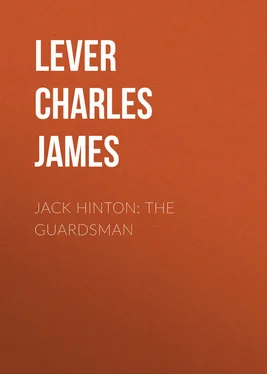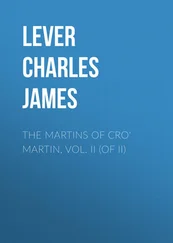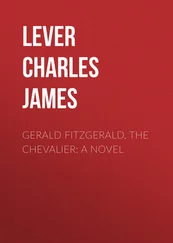Charles Lever - Jack Hinton - The Guardsman
Здесь есть возможность читать онлайн «Charles Lever - Jack Hinton - The Guardsman» — ознакомительный отрывок электронной книги совершенно бесплатно, а после прочтения отрывка купить полную версию. В некоторых случаях можно слушать аудио, скачать через торрент в формате fb2 и присутствует краткое содержание. Жанр: literature_19, foreign_antique, foreign_prose, на английском языке. Описание произведения, (предисловие) а так же отзывы посетителей доступны на портале библиотеки ЛибКат.
- Название:Jack Hinton: The Guardsman
- Автор:
- Жанр:
- Год:неизвестен
- ISBN:нет данных
- Рейтинг книги:5 / 5. Голосов: 1
-
Избранное:Добавить в избранное
- Отзывы:
-
Ваша оценка:
- 100
- 1
- 2
- 3
- 4
- 5
Jack Hinton: The Guardsman: краткое содержание, описание и аннотация
Предлагаем к чтению аннотацию, описание, краткое содержание или предисловие (зависит от того, что написал сам автор книги «Jack Hinton: The Guardsman»). Если вы не нашли необходимую информацию о книге — напишите в комментариях, мы постараемся отыскать её.
Jack Hinton: The Guardsman — читать онлайн ознакомительный отрывок
Ниже представлен текст книги, разбитый по страницам. Система сохранения места последней прочитанной страницы, позволяет с удобством читать онлайн бесплатно книгу «Jack Hinton: The Guardsman», без необходимости каждый раз заново искать на чём Вы остановились. Поставьте закладку, и сможете в любой момент перейти на страницу, на которой закончили чтение.
Интервал:
Закладка:
“How good! glorious, by Jove! eh, O’Grady? You are a sure ticket there — l’ami de la maison! ”
O’Grady’s cheek became red at these words; and a flashing expression in his eyes told how deeply he felt them. He turned sharply round, his lip quivering with passion; then, checking himself suddenly, he burst into an affected laugh,
“You’ll go too, wont you?”
“I? No, faith, they caught me once; but then the fact was, a protest and an invitation were both served on me together. I couldn’t accept one, so I did the other.”
“Well, I must confess,” said O’Grady, in a firm, resolute tone, “there may be many more fashionable people than our friends; but I, for one, scruple not to say I have received many kindnesses from them, and am deeply, sincerely grateful.”
“As far as doing a bit of paper now and then, when one is hard up,” said Lord Dudley, “why, perhaps, I’m somewhat of your mind; but if one must take the discount out in dinners, it’s an infernal bore.”
“And yet,” said O’Grady, maliciously, “I’ve seen your Lordship tax your powers to play the agreeable at these same dinners; and I think your memory betrays you in supposing you have only been there once. I myself have met you at least four times.”
“Only shows how devilish hard up I must have been,” was the cool reply; “but now, as the governor begins to behave better, I think I’ll cut Paul.”
“I’m certain you will,” said O’Grady, with an emphasis that could not be mistaken. “But come, Hinton, we had better be moving; there’s some stir at the portico yonder, I suppose they’re coming.”
At this moment the tramp of cavalry announced the arrival of the guard of honour; the drums beat, the troops stood to arms, and we had barely time to mount our horses, when the viceregal party took their places in the carriages, and we all set out for the Phoenix.
“Confess, Hinton, it is worth while being a soldier to be in Ireland.” This was O’Grady’s observation as we rode down Parliament-street, beside the carriage of the Viceroy. It was the first occasion of a field-day since the arrival of his Excellency, and all Dublin was on the tiptoe of expectation at the prospect. Handkerchiefs were waved from the windows; streamers and banners floated from the house-tops; patriotic devices and allegoric representations of Erin sitting at a plentiful board, opposite an elderly gentleman with a ducal coronet, met us at every turn of the way. The streets were literally crammed with people. The band played Patrick’s-day; the mob shouted, his Grace bowed; and down to Phil O’Grady himself, who winked at the pretty girls as he passed, there did not seem an unoccupied man in the whole procession. On we went, following the line of the quays, threading our way through a bare-legged, ragged population, bawling themselves hoarse with energetic desires for prosperity to Ireland. “Yes,” thought I, as I looked upon the worn, dilapidated houses, the faded and bygone equipages, the tarnished finery of better days – “yes, my father was right, these people are very different from their neighbours; their very prosperity has an air quite peculiar to itself.” Everything attested a state of poverty, a lack of trade, a want of comfort and of cleanliness; but still there was but one expression prevalent in the mass – that of unbounded good humour and gaiety. With a philosophy quite his own, poor Paddy seemed to feel a reflected pleasure from the supposed happiness of those around him, the fine clothes, the gorgeous equipages, the prancing chargers, the flowing plumes – all, in fact, that forms the appliances of wealth – constituting in his mind a kind of paradise on earth. He thought their possessors at least ought to be happy, and, like a good-hearted fellow, he was glad of it for their sakes.
There had been in the early part of the day an abortive effort at a procession. The Lord Mayor and the Sheriffs, in their state liveries, had gone forth with a proud following of their fellow-citizens; but a manouvre, which hitherto has been supposed exclusively the province of the navy, was here employed with unbounded success; and the hackney coachmen, by “cutting the line” in several places, had completely disorganised the procession, which now presented the singular spectacle of an aldermanic functionary with emblazoned panels and bedizened horses, followed by a string of rackety jaunting-cars, or a noddy with its fourteen insides. Horsemen there were, too, in abundance. Were I to judge from the spectacle before me, I should say that the Irish were the most equestrian people of the globe; and at what a pace they went! Caring little or nothing for the foot-passengers, they only drew rein when their blown steeds were unable to go further, and then dashed onwards like a charge, amid a shower of oaths, curses, and imprecations, half drowned in the laughter that burst on every side. Deputations there were also from various branches of trade, entreating their Graces to wear and to patronise the manufacture of the country, and to conform in many respects to its habits and customs: by all of which, in my then ignorance, I could only understand the vehement desire of the population that the viceregal court should go about in a state of nature, and limit their diet to poteen and potatoes.
“Fine sight this, Hinton! Isn’t it cheering?” said O’Grady, as his eye beamed with pleasure and delight.
“Why, yes,” said I, hesitatingly; “but don’t you think if they wore shoes – ”
“Shoes!” repeated he, contemptuously, “they’d never suffer such restrictions on their liberties. Look at them! they are the fellows to make soldiers of! The only fear of half-rations with them would be the risk of indigestion.”
On we went, a strange and motley mass, the only grave faces being a few of those who sat in gilded coaches, with embroidered hammercloths, while every half-naked figure that flitted past had a countenance of reckless jollity and fun. But the same discrepancy that pervaded the people and the procession was visible even in their dwellings, and the meanest hovels stood side by side with the public and private edifices of elegance and beauty.
“This, certainly,” thought I, “is a strange land.” A reflection I had reason to recur to more than once in my after experience of Ireland.
CHAPTER V. THE REVIEW IN THE PHOENIX
Winding along the quays, we crossed an old and dilapidated bridge; and after traversing some narrow and ruinous-looking streets, we entered the Park, and at length reached the Fifteen Acres.
The carriages were drawn up in a line; his Grace’s led horses were ordered up, and staff-officers galloped right and left to announce the orders for the troops to stand to arms.
As the Duke descended from his carriage he caught my eye, and turning suddenly towards the Duchess, said, “Let me present Mr. Hinton to your Grace.”
While I was making my bows and acknowledgments, his Grace put his hand upon my arm.
“You know Lady Killimore, Hinton? Never mind, it’s of no consequence. You see her carriage yonder – they have made some blunder in the road, and the dragoons, it seems, wont let them pass. Just canter down and rescue them.”
“Do, pray, Mr. Hinton,” added the Duchess. “Poor Lady Killimore is so very nervous she’ll be terrified to death if they make any fuss. Her carriage can come up quite close; there is plenty of room.”
“Now, do it well,” whispered O’Grady: “there is a pretty girl in the case; it’s your first mission; acquit yourself with credit.”
An infernal brass band playing “Rule Britannia” within ten paces of me, the buzz of voices, the crowd, the novelty of the situation, the excitement of the moment, all conspired to addle and confuse me; so that when I put spurs to my horse and struck out into a gallop, I had no very precise idea of what I was to do, and not the slightest upon earth of where I was to do it.
Читать дальшеИнтервал:
Закладка:
Похожие книги на «Jack Hinton: The Guardsman»
Представляем Вашему вниманию похожие книги на «Jack Hinton: The Guardsman» списком для выбора. Мы отобрали схожую по названию и смыслу литературу в надежде предоставить читателям больше вариантов отыскать новые, интересные, ещё непрочитанные произведения.
Обсуждение, отзывы о книге «Jack Hinton: The Guardsman» и просто собственные мнения читателей. Оставьте ваши комментарии, напишите, что Вы думаете о произведении, его смысле или главных героях. Укажите что конкретно понравилось, а что нет, и почему Вы так считаете.












